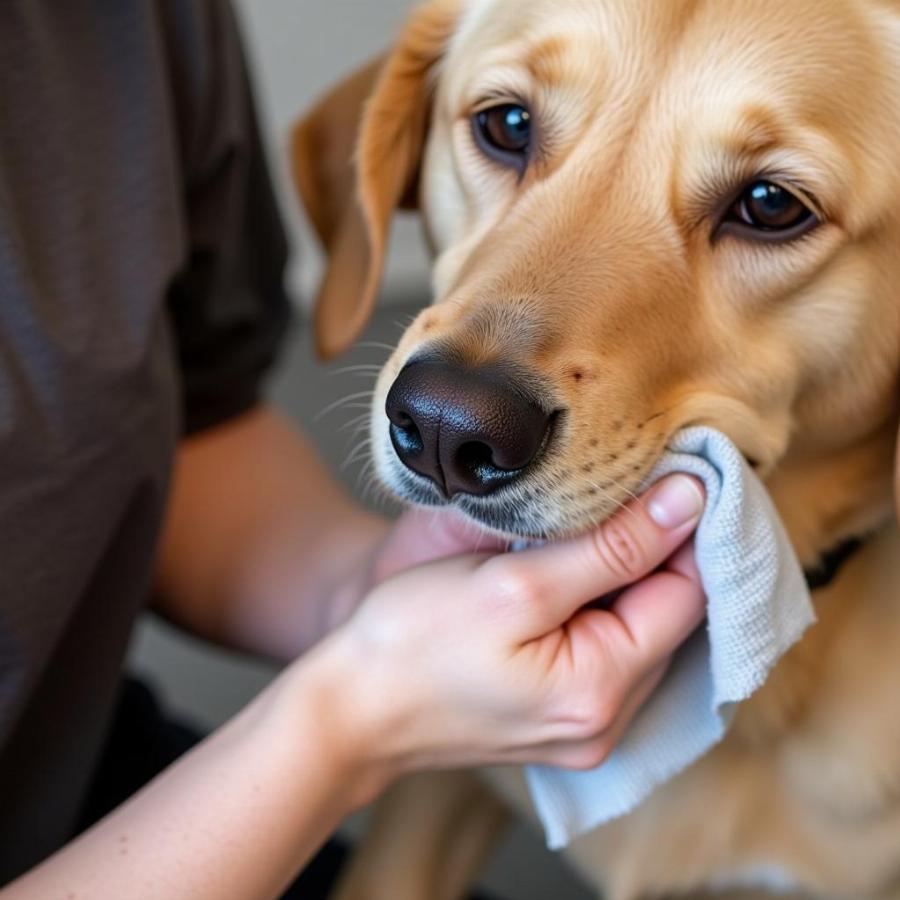A runny nose in dogs, also known as nasal discharge, can be concerning for any pet owner. While a little clear discharge can be normal, a persistent or colored runny nose might indicate an underlying health issue. Understanding the potential causes, treatments, and when to seek veterinary attention is crucial for ensuring your furry friend’s well-being.
Decoding Your Dog’s Runny Nose: What’s Normal and What’s Not
A small amount of clear, watery nasal discharge can be perfectly normal for dogs, especially after they’ve been excited or exercising. However, changes in the color, consistency, or amount of discharge can signal a problem. Is it thick, yellow, green, or even bloody? These are signs that warrant further investigation. Furthermore, accompanying symptoms like sneezing, coughing, or difficulty breathing add to the urgency.
Common Culprits Behind a Runny Nose Dog
Several factors can contribute to a runny nose in dogs, ranging from minor irritations to more serious conditions. Allergies, similar to humans, are a common cause, triggering a watery discharge often accompanied by sneezing. Inhalants like dust, pollen, and mold can be the culprits. Infections, whether viral, bacterial, or fungal, can also lead to nasal discharge, often thicker and discolored. Foreign objects lodged in the nasal passages, although less frequent, can also cause a unilateral runny nose. And in rarer cases, tumors or polyps can be the underlying cause.
Allergies: A Common Trigger for Runny Nose in Dogs
Just like us, dogs can suffer from allergies that manifest as a runny nose. Seasonal allergies, often triggered by pollen, can cause a clear, watery discharge, while allergies to dust mites or mold can be year-round. Identifying and managing these allergens can significantly improve your dog’s comfort.
When to Seek Veterinary Help for Your Dog’s Runny Nose
While a mild, clear runny nose might resolve on its own, certain signs warrant immediate veterinary attention. A persistent runny nose lasting more than a few days, changes in the color or consistency of the discharge to yellow, green, or bloody, and accompanying symptoms like fever, lethargy, or difficulty breathing are all red flags. Don’t hesitate to contact your vet if you notice any of these concerning signs.
Dog Sneezing and Runny Nose: Could it be Kennel Cough?
Kennel cough, a highly contagious respiratory infection, often presents with a runny nose, sneezing, and a persistent cough. Early diagnosis and treatment are essential to prevent the spread of the infection.
my dog has a runny nose and sneezes
Treating a Runny Nose in Dogs: From Home Remedies to Veterinary Interventions
Treatment for a runny nose in dogs varies depending on the underlying cause. For allergies, managing the environment and minimizing exposure to allergens can be helpful. Your veterinarian may also recommend antihistamines or other allergy medications. For infections, antibiotics or antifungals may be necessary. In cases of foreign objects or tumors, surgical intervention might be required.
Home Care Tips for Dogs with Runny Noses
While veterinary care is crucial for diagnosing and treating the underlying cause, certain home care measures can help alleviate your dog’s discomfort. Keeping their nostrils clean with a damp cloth, ensuring adequate hydration, and using a humidifier can provide relief.
 Chăm sóc chó chảy mũi
Chăm sóc chó chảy mũi
Runny Nose Dog: A Summary of Key Takeaways
A runny nose in dogs can be a symptom of various conditions, from minor allergies to more serious infections. Understanding the different types of nasal discharge, recognizing when to seek veterinary help, and knowing the available treatment options are essential for responsible dog ownership.
FAQ: Your Questions About Runny Nose in Dogs Answered
-
Is a clear runny nose in dogs always a cause for concern? No, a small amount of clear discharge can be normal, especially after exercise or excitement.
-
When should I take my dog to the vet for a runny nose? If the discharge becomes thick, colored, or bloody, or if it’s accompanied by other symptoms like sneezing, coughing, or difficulty breathing.
-
What can I do at home to help my dog with a runny nose? Keep their nostrils clean, ensure they’re hydrated, and use a humidifier.
-
Can allergies cause a runny nose in dogs? Yes, allergies are a common cause of runny noses in dogs.
-
What are the treatment options for a runny nose in dogs? Treatment depends on the cause and can range from allergy management to antibiotics or even surgery.
-
Can a runny nose be a sign of a serious illness in dogs? While often minor, a runny nose can sometimes indicate a more serious condition, so it’s important to monitor your dog closely.
-
How can I prevent my dog from getting a runny nose? Maintaining a clean environment, managing allergens, and ensuring your dog’s overall health can help minimize the risk of runny noses.
Beaut Dogs is your trusted source for all things dog-related. We’re committed to providing comprehensive and reliable information to help you care for your canine companion. For personalized advice and answers to your specific questions, please contact us at [email protected] (Email address). Beaut Dogs is here to support you and your furry friend every step of the way.